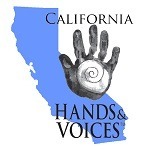I self-identify as….
Hard of Hearing (if CI’s are on), deaf (if CI’s are off)
Please share a little about your education placement & extracurricular activities as a youth.
I was mainstreamed (no need to move), stayed consistent throughout K-12. I received FMs (microphones and speakers) and CART. I was involved with some extracurriculars such as Key Club.
Please tell us about your relationships with DHH peers as a youth and how they impacted your life.
I have several close friends DHH friends from CCHAT, a preschool we went to together. When we went our separate paths, we found ways to meet and otherwise maintain our friendships – one being through the annual attendance of DHH Family Camp, one of my fondest memories. We are friends even now, over 20 years later. Both CCHAT and DHH Family Camp were vital to maintaining my connections to my DHH peers.
Did you attend your IEP meetings? What memories do you have of your IEP, goals and services?
I was “forced” to attend as in my youth – I would much rather have been reading my countless books. I was there just to answer questions at first. Beginning sometimes in middle school, I began taking a much more active role and paying attention to what was going on. I was fortunate to have a strongly qualified group of people for my IEP meetings, and I do not recall anything not being followed.
What type of technology, apps or products for Deaf and Hard of Hearing individuals do you use?
I use my Cochlear Implants (two) along with a Compilot II. I use the Compilot for listening to music by connecting to my laptop, or for having meetings online. However, most of the time, I am completely deaf.
Can you tell us a little about your college experience and how did you prepare for college? Any tips?
I went to UCSD, which had a horribly outdated system for microphones and had a policy that transcriptionists could not email their transcripts to the students after class. After meeting with them, they agreed to update their microphone system to something more compatible with my implants – and they changed their policy so that transcriptionists could email me the transcripts (although I had to agree not to share it with anyone else). For the dorm, there were visible alarms installed for safety reasons.
Please tell us about your relationships with DHH peers as an adult. When meeting a new person what script have you found helpful when telling them that you are DHH?
I still have DHH friends, but we’re spread across the country! When I meet a new person, I typically tell them that I’m DHH – but not too much of a fuss is made asides from the occasional reminder that I need to lipread (when they cover their mouths) or similar.
Most DHH children are born to hearing parents. This question may help parents see the world through their child’s eyes. Please tell us about your day to day life experiences as a DHH adult.
I found having a severe hearing loss (and when I got CI’s, my cochlea was so twisted it was only a partial implantation) very isolating throughout my life. I was surrounded by hearing people and my DHH friends were in other schools. In K-12, lunch times or other social times were too noisy for me to understand anyone. In class, it took my all my focus just to understand the teacher. There were moments where I tried to go out of my way to make friends, but I was either rejected or it was too annoying for other children to repeat themselves or otherwise make sure I could understand them, As a result, I was lonely – and in many ways, I developed the habit to be asocial over the process of 10 years. This habit of being asocial continued throughout college and I developed severe depression, of which I am taking medication for even now. It is partially due to this I’ve long thought that being DHH is primarily a social disability more than a physical disability.
Let’s go out with a bang! Complete this sentence to debunk a misconception about Deaf or Hard of Hearing people. “People may be surprised to know that I…..”
am not fluent in sign language.
